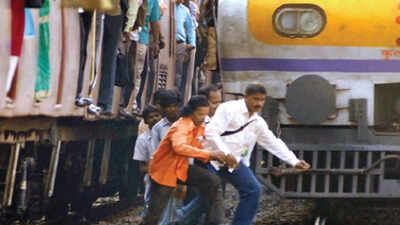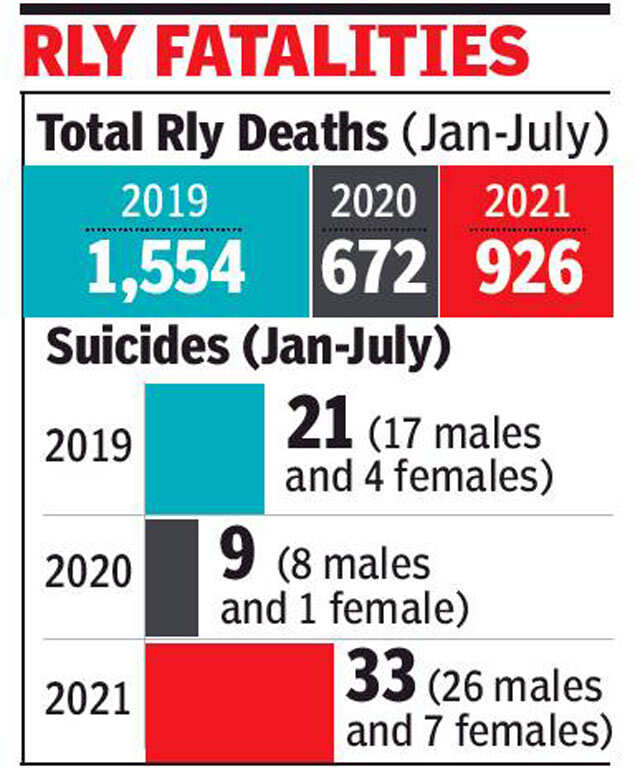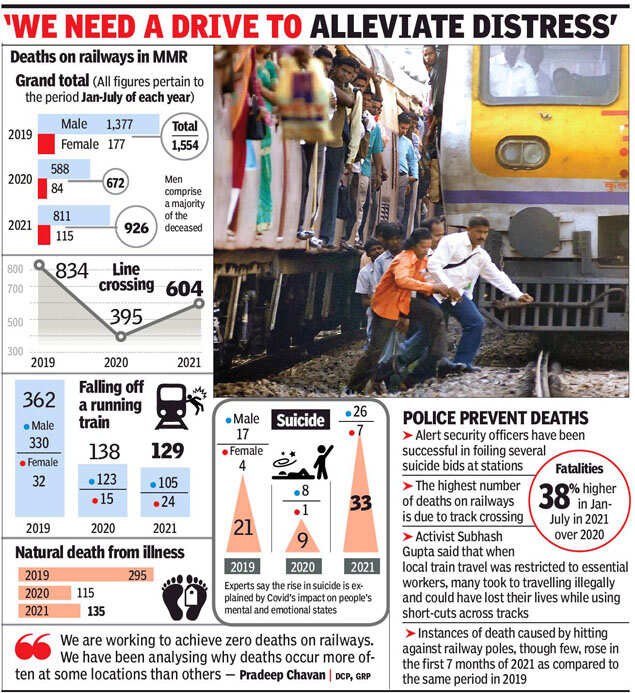Top Searches
- News
- City News
- mumbai News
- Covid impact? Deaths by suicide on Mumbai's railway tracks rise sharply over 2019
Covid impact? Deaths by suicide on Mumbai's railway tracks rise sharply over 2019

Picture used for representational purpose only
MUMBAI: Deaths by suicide on Mumbai's railway network in the first seven months of this year (33) have exceeded those in the pre-pandemic period of January-July 2019 (21) by 57%. Nine deaths were reported during the same period in 2020 when services were few and entry to station areas was restricted.
Mental health experts said the high number of suicides was the impact that the pandemic could have had on people's mental and emotional state. One of the reasons for a high number of suicides occurring on railways is because they are likely to get clubbed as accidents in police reports and this translates into less shame for family members.

Overall, 926 fatalities were reported on the railways this year, about 38% higher than in January-July 2020. In the corresponding period in 2019, a total of 1,554 deaths were reported. Illegal track crossing was the biggest killer in all three years.
In July, a homemaker from Ulhasnagar jumped to her death before a running train at Asangaon, along with her two-year-old daughter. A police investigation established that she was being harassed by her husband and in-laws who also doubted her fidelity. “Instances of domestic violence increased during the pandemic,” said psychiatrist Dr Harish Shetty. “The focus has largely been on Covid-19 and resultant fatalities while the focus on mental health has been much less. The suicide figures are an indicator of a silent mental health epidemic.”

Data suggests that more suicides were reported on Central Railway than on Western Railway, and in the fringes of the city. A majority of the deceased (78%) were men. In April, an engineer who had recovered from Covid-19 developed respiratory trouble thereafter, which is said to have pushed him to end his life. CCTV cameras at Dombivai station captured him sitting on the platform for a few minutes before leaping in front of Konark Express.
“In the absence of clear CCTV footage or a strong statement from the motorman or eyewitness, it becomes difficult to establish if a death on the railways is suicide or not,” said a police officer. At times, the police or the motorman might report a suicide as an accident so that the deceased's family can seek insurance, particularly if they are not doing well financially.
“The pandemic has led to financial ruin, loss of jobs, unemployment, and lack of opportunities, which has triggered feelings of anxiety and depression, helplessness, hopelessness as well as worthlessness. The government needs to involve mental health experts and create a nationwide media campaign to alleviate public distress and offer increased mental health support as part of the National Health Mission. It could involve NGOs and other mental health experts in helping identify people who are at risk by using standardised tools to measure ‘life stress’. This will definitely help in managing an unnecessary loss of life,” said psychologist Narendra Kinger.
Mental health experts said the high number of suicides was the impact that the pandemic could have had on people's mental and emotional state. One of the reasons for a high number of suicides occurring on railways is because they are likely to get clubbed as accidents in police reports and this translates into less shame for family members.

Overall, 926 fatalities were reported on the railways this year, about 38% higher than in January-July 2020. In the corresponding period in 2019, a total of 1,554 deaths were reported. Illegal track crossing was the biggest killer in all three years.
In July, a homemaker from Ulhasnagar jumped to her death before a running train at Asangaon, along with her two-year-old daughter. A police investigation established that she was being harassed by her husband and in-laws who also doubted her fidelity. “Instances of domestic violence increased during the pandemic,” said psychiatrist Dr Harish Shetty. “The focus has largely been on Covid-19 and resultant fatalities while the focus on mental health has been much less. The suicide figures are an indicator of a silent mental health epidemic.”

Data suggests that more suicides were reported on Central Railway than on Western Railway, and in the fringes of the city. A majority of the deceased (78%) were men. In April, an engineer who had recovered from Covid-19 developed respiratory trouble thereafter, which is said to have pushed him to end his life. CCTV cameras at Dombivai station captured him sitting on the platform for a few minutes before leaping in front of Konark Express.
“In the absence of clear CCTV footage or a strong statement from the motorman or eyewitness, it becomes difficult to establish if a death on the railways is suicide or not,” said a police officer. At times, the police or the motorman might report a suicide as an accident so that the deceased's family can seek insurance, particularly if they are not doing well financially.
“The pandemic has led to financial ruin, loss of jobs, unemployment, and lack of opportunities, which has triggered feelings of anxiety and depression, helplessness, hopelessness as well as worthlessness. The government needs to involve mental health experts and create a nationwide media campaign to alleviate public distress and offer increased mental health support as part of the National Health Mission. It could involve NGOs and other mental health experts in helping identify people who are at risk by using standardised tools to measure ‘life stress’. This will definitely help in managing an unnecessary loss of life,” said psychologist Narendra Kinger.
FacebookTwitterLinkedinEMail
Start a Conversation
end of article

